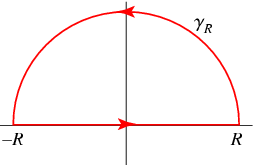How to solve the integral using the residue theorem int_(-oo)^(+oo)(cos(x)/(x^4+x^2+1))dx?
1 Answer
int_(-oo)^(oo) ( cosx ) / ( x^4 + x^2 +1 ) \ dx = e^(-sqrt(3)/2)pi{ sqrt(3)/3cos(1/2) +sin(1/2) }
" " = 1.303046536141762 ...
Explanation:
Sorry that this is such a long solution:
We seek:
I = int_(-oo)^(oo) \ ( cosx ) / ( x^4 + x^2 +1 ) \ dx
graph{( cosx ) / ( x^4 + x^2 +1 ) [-5, 5, -2.5, 2.5]}
The function is well defined over the domain
f(z) = ( e^(iz) ) / ( z^4 + z^2 +1 ) \ \ \ \ \ (= ( cosz+isinz ) / ( z^4 + z^2 +1 ) )
And its associated contour integral:
oint_C \ f(z) \ dz
Where
We will restrict
z^4+z^2+1 = 0 => =0
z^2-z+1 = 0 => z = \ \ \ \ 1/2+-sqrt(3)/2i
z^2+z+1 = 0 => z = -1/2+-sqrt(3)/2i

We need only be concerned with the two poles in Q1 and Q2, that (providing we make
So then:
oint_C \ f(z) \ dz = int_(-R)^(R) \ f(x) \ dx + int_(gamma_R) \ f(z) \ dz
As
z_1 = -1/2+sqrt(3)/2i \ \ and\ \ z_2 = 1/2+sqrt(3)/2i
Then by the residue theorem:
oint_C \ f(z) \ dz = 2pii xx ( ("sum of the residues of the"), ("poles of " f(z) " within "C) )
" " = 2pii \ { res_(z=z_1) \ f(z) + res_(z=z_2) \ f(z) }
And we can calculate the residues as follows:
res_(z=z_1) = lim_(z rarr z_1) (z-z_1) f(z)
" " = lim_(z rarr z_1) (z-z_1) ( e^(iz) ) / ( (z^2-z+1)(z^2+z+1) )
" " = lim_(z rarr z_1) (z-z_1) ( e^(iz) ) / ( (z^2-z+1)(z-z_1)(z-barz_1) )
" " = lim_(z rarr z_1) ( e^(iz) ) / ( (z^2-z+1)(z-barz_1) )
" " = e^(-sqrt(3)/2+1/2i) (-1/4-sqrt(3)/12i)
" " = e^(-sqrt(3)/2)e^(1/2i) (-1/4-sqrt(3)/12i)
Similarly:
res_(z=z_2) = lim_(z rarr z_2) (z-z_2) f(z)
" " = lim_(z rarr z_2) (z-z_2) ( e^(iz) ) / ( (z^2-z+1)(z^2+z+1) )
" " = lim_(z rarr z_2) (z-z_2) ( e^(iz) ) / ( (z-z_2)(z-barz_2)(z^2+z+1) )
" " = lim_(z rarr z_2) ( e^(iz) ) / ( (z-barz_2)(z^2+z+1) )
" " = e^(-sqrt(3)/2-1/2i) (1/4-sqrt(3)/12i)
" " = e^(-sqrt(3)/2)e^(-1/2i) (1/4-sqrt(3)/12i)
So using these results along with the residue theorem we get:
oint_C \ f(z) \ dz = 2e^(-sqrt(3)/2)pii{ -1/4e^(1/2i)-sqrt(3)/12e^(1/2i)i + 1/4e^(-1/2i)-sqrt(3)/12e^(-1/2i)i }
" " = 2e^(-sqrt(3)/2)pi{ -1/4e^(1/2i)i+sqrt(3)/12e^(1/2i) + 1/4e^(-1/2i)i+sqrt(3)/12e^(-1/2i) }
" " = 2e^(-sqrt(3)/2)pi{ sqrt(3)/12(e^(1/2i) + e^(-1/2i)) +1/4(e^(-1/2i)-e^(1/2i))i }
We can simplify the expression as:
e^(1/2i) + e^(-1/2i) = cos(1/2)+isin(1/2) + cos(-1/2)+isin(-1/2)
" " = cos(1/2)+isin(1/2) +cos(1/2)-isin(1/2)
" " = 2cos(1/2)
And:
e^(-1/2i)-e^(1/2i) = cos(-1/2)+isin(-1/2) -cos(1/2)-isin(1/2)
" " = cos(1/2)-isin(1/2) -cos(1/2)-isin(1/2)
" " = e^(-1/2i)-e^(1/2i) = -2isin(1/2)
Hence:
oint_C \ f(z) \ dz =2e^(-sqrt(3)/2)pi{ sqrt(3)/12(2cos(1/2)) +1/4(2sin(1/2)) }
" " = e^(-sqrt(3)/2)pi{ sqrt(3)/3cos(1/2) +sin(1/2) }
Earlier we established that:
oint_C \ f(z) \ dz = int_(-R)^(R) \ f(x) \ dx + int_(gamma_R) \ f(z) \ dz
Now, as we let
oint_C \ f(z) \ dz = int_(-oo)^(oo) \ f(x) \ dx + int_(gamma_R) \ f(z) \ dz
As is often the case with contour integrals, we find that:
lim_(R rarr oo) int_(gamma_R) \ f(z) \ dz = 0
I will omit the proof (as it is several pages long) but this can be verified using the Estimation Lemma.
Hence, in summary we have:
int_(-oo)^(oo) ( e^(iz) ) / ( z^4 + z^2 +1 ) \ dz = int_(-oo)^(oo) ( cosx +isinx) / ( x^4 + x^2 +1 ) \ dx
" " = int_(-oo)^(oo) ( cosx) / ( x^4 + x^2 +1 ) \ dx + i \ int_(-oo)^(oo) ( sinx) / ( x^4 + x^2 +1 ) \ dx
" " = e^(-sqrt(3)/2)pi{ sqrt(3)/3cos(1/2) +sin(1/2) }
Equating Real parts we then get the desired result:
int_(-oo)^(oo) ( cosx ) / ( x^4 + x^2 +1 ) \ dx = e^(-sqrt(3)/2)pi{ sqrt(3)/3cos(1/2) +sin(1/2) }
" " = 1.303046536141762 ...
As a bonus, by equating imaginary parts, we also get
int_(-oo)^(oo) ( sinx ) / ( x^4 + x^2 +1 ) \ dx = 0
But that should come as no surprise as the integrand is an odd function!


